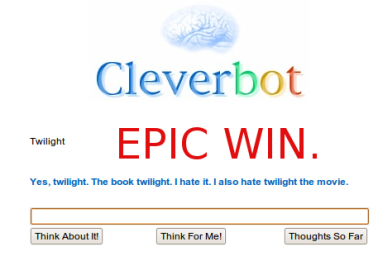 Suffice it to say, Cleverbot might have just successfully passed the Voight-Kampff test.
Suffice it to say, Cleverbot might have just successfully passed the Voight-Kampff test.
Or the Turing test, if you want to avoid literature references.
Thirty volunteers were used at the Techniche festival in India. Each of the volunteers participated in a 4-minute conversation with an unknown other party. Half of the volunteers were talking to Cleverbot, while half of them were speaking to real humans. These conversations were displayed on large screens, where the audience watched.
Basically, the Turing test says that if a human talking to a machine believes the machine to be human, the machine passes the test.
Well, Cleverbot was rated as human by 59.3% of volunteers, as well as the audience. The humans, however, were rated as “human” by only 63.3% of votes. There were 1334 votes in total, counting the volunteers and the audience.
However, this doesn’t mean that Cleverbot is “smart”. It just means that it has the ability to imitate intelligence.
 Gearfuse Technology, Science, Culture & More
Gearfuse Technology, Science, Culture & More


